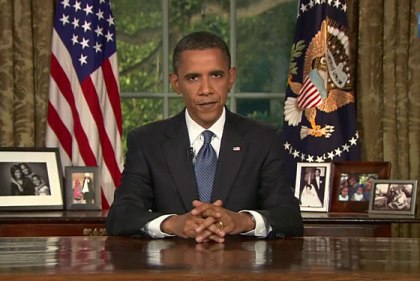
Words, words and more words — they were once enough, but not anymore. Last night Barack Obama spoke of the oil spill, addressing the nation from the Oval Office, at the hour of maximum audience, since it happens only at solemn and tragic times for the Nation. But the solemn speech didn’t convince anyone. So yesterday the President was forced to abandon the rhetoric.
British Petroleum has agreed to create a $20 billion fund to compensate the victims of the oil spill, which started on April 20 and is still in progress.
Twenty billion is a lot — more than expected. The amount was announced right at the White House, where in the morning the leaders of the British company were received in full force. Serious, contrite faces spoke for 20 minutes with Obama himself. Then, at lunch, they spoke for 90 with Vice President Joe Biden while the lawyers of both parties were determining the final details. In the afternoon came the announcement.
The $20 billion will be managed by an independent fund led by Kenneth Feinberg, who was also given responsibility of the fund for the victims of September 11.
BP still cannot plug the leak, and therefore the problem remains unresolved, but at least Obama can now declare that those responsible for the disaster will pay for their negligence and that those who have suffered economic damage will somehow be rewarded. The White House, until now accused of complacency toward the British multinational, can finally give itself some credit and project the image that ultimately justice will prevail — in theory. Still, many questions remain open. Yesterday, British Prime Minister David Cameron, who now has openly taken the side of BP, said that the compensation cannot be unlimited. Otherwise the society will go bankrupt. In other words: Don’t think about asking for more than $20 billion.
The American public opinion continues to be dissatisfied with the way the government dealt with the emergency, with discontent peaking in Louisiana, which had to suffer through both Hurricane Katrina and the oil spill. Well, today the people of this state believe that Obama has behaved even worse than George Bush at the time of the flooding in New Orleans. The rate of approval of the President continues to decline. Only 24 percent of American voters are very satisfied with his work, while 44 percent expresses a profound disappointment. The total of the disappointed is 57 percent, a record.
Yesterday’s announcement will undoubtedly help Obama regain some points, but it won’t be enough to change the opinion about him, which the televised speech, courtly in tone but evanescent in its content, has confirmed. Obama announced the appointment of a “czar” for the emergency, but without attributing him great powers, and urged America to embrace the cause of clean energy, but without indicating concrete solutions. The most popular President has become the most rhetorical one. From “Yes We Can” he has passed to “Maybe, we can,” or from “Yes we can do” to “Can do, perhaps.” America has discovered Obama’s true character: He prefers to wait and mediate reflectively, he is sensitive to pressure from lobbies and he is refractory to act under pressure and make decisions in times of emergency. He prefers the long run — sometimes very long. It has been almost two months since the accident that caused the damage of the oil well in the Gulf of Mexico, but the Commander in Chief is only now making sure that BP really accepts its responsibilities.
However, Americans are asking themselves why the operations to close that damned black hole remained a prerogative of BP rather than be entrusted to civil defense and the army, as would have been logical. The implied answer is that so far Obama has not been able to resist the pressures of the oil lobbies, whose interests were put before those of the nation, and everyone can see the results.

Leave a Reply
You must be logged in to post a comment.